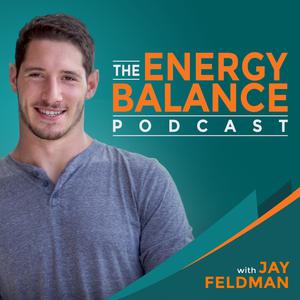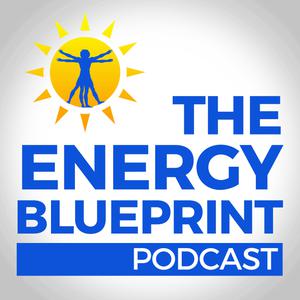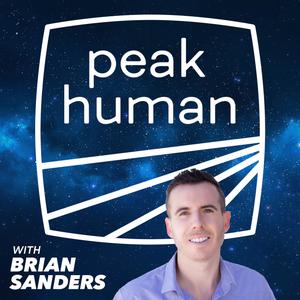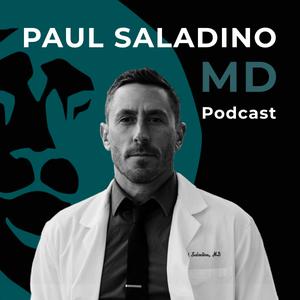
The Energy Balance Podcast
Jay Feldman Wellness
Discover how you can live without constant hunger and fatigue, brain fog, poor sleep, and other low-energy symptoms. The Energy Balance Podcast will teach you how to maximize your cellular energy so you can take back your health and finally experience clear-headed focus, restful sleep, and all-day energy you didn’t think was possible.
- 54 minutes 30 secondsEp. 127: Lipolysis and Fat Loss: Lose Body Fat Without Increasing Fat BurningIn this episode we discuss:
- Why increasing lipolysis through low-carb diets, cold plunges, fasting, and excess exercise is not necessary for fat loss
- How less lipolysis can lead to more fat loss
- The role of fat release and free fatty acids in diabetes, fatty liver disease, and obesity
- What to focus on instead of lipolysis to support healthy fat loss
Free Energy Balance Food Guide: https://jayfeldmanwellness.com/guide
Free Energy Balance Mini-Course: https://www.jayfeldmanwellness.com/energy/
Check out the Energy Balance Solution program here: https://www.jayfeldmanwellness.com/solution/
Click here to check out the show notes: https://www.jayfeldmanwellness.com/ep-127-lipolysis-and-fat-loss-lose-body-fat-without-increasing-fat-burning/
Timestamps:
0:00 – intro
1:08 – the fat loss narrative: release more fat from your fat stores through intense exercise, fasting, cold plunges, and low-carb diets
4:08 – how fat gets released from our fat stores
8:40 – the baseline rate of fat release from our fat stores and the impact of degenerative states like cancer on lipolysis
12:09 – how fat is released from our fat stores in response to stressors like exercise
15:34 – the connection between lipolysis, metabolic syndrome, and fatty liver disease
23:29 – the research showing that decreasing lipolysis leads to less body fat (not more)
33:47 – whether we want to block hormone-sensitive lipase (HSL) activity
37:47 – the research showing that increasing fat burning and lipolysis does not increase fat loss
44:25 – how to lose body fat without relying on stress-driven fat oxidation
49:56 – strategies for fat loss without increased lipolysis: are exercise, fasting, and cold plunges the solution?
10 January 2025, 1:20 pm - 1 hour 52 minutesBV #5: Robert Lustig on Fructose, Dave Asprey’s Criticism of Ray Peat, & Jordan Peterson on SerotoninIn this episode we discuss:
- How Jack & Dalton from Analyze & Optimize were introduced to the work of RayPeat
- Robert Lustig's claims that fructose is as harmful to the liver as alcohol
- Whether Jordan Peterson’s Serotonin Hierarchy has any merit
- The negative effects of the carnivore diet, especially on gut health
- The link between birth control and cancer and the protective effects of progesterone
- What we think of Dave Asprey’s thoughts on the “Ray Peat diet”
Analyze & Optimize's Website: https://www.analyzeandoptimize.io/
Check out the Energy Balance Solution program here: https://www.jayfeldmanwellness.com/solution/
Download the Free Energy Balance Food Guide here: https://www.jayfeldmanwellness.com/guide/
Danny's Telegram: https://t.me/dannyroddy
Timestamps:
0:00 – intro
0:38 – how Analyze & Optimize (Jack & Dalton) got introduced to work of Ray Peat
6:32 – how Analyze & Optimize create their videos
10:40 – refuting Robert Lustig's claims – is fructose as harmful to the liver as alcohol?
17:40 – whether Analyze & Optimize are paid by “big sugar”
20:30 – Robert Lustig’s fructose claims are unsupported
28:06 – is white sugar safe to consume?
33:04 – Serotonin & Hierarchy by Jordan Peterson
34:33 – SSRI use and serotonin’s role in promoting learned helplessness and anhedonia
40:46 – how the perceived benefits of serotonin could be attributed to other factors
45:45 – whether serotonin is the “dominance” hormone
47:17 – Analyze & Optimize respond to Shawn Baker on sugar cravings being a sign of health and youth
51:04 – declining health on the carnivore diet, whether it’s sustainable, and why your immune system needs carbohydrates
54:04 – carnivore diet effects on gut health – quorum sensing, biofilms, high stress hormones, and damage to thyroid health
1:01:30 – why chronic low-calorie intake turns down metabolic function and leads to obesity
1:07:00 – the harm caused by conflating progesterone and synthetic progestins
1:14:57 – the link between birth control and cancer and the protective effects of progesterone
1:18:20 – the negative effects of synthetic progestins and estrogen, especially unchecked by natural progesterone
1:24:45 – Why Is the Right So Obsessed with Seed Oils? by Ej Dickson
1:31:15 – Dave Asprey argues with Paul Saladino on supplements vs orange juice
1:39:10 – whether Ray Peat’s ideas and principles promote orthorexia
1:44:22 – using precision medicine vs. listening to your body
1:51:09 – where to find more of Jack & Dalton’s work
19 December 2024, 2:37 pm - 48 minutes 1 secondEp. 126: High Triglycerides on a High-Carb Diet: Should You Be Worried?In this episode we discuss:
- What causes increased triglycerides on a high-carb diet
- Whether the small, dense LDL particles are really the culprits behind cardiovascular disease
- How lipid values on a high-carb diet compared to a low-carb diet, including lean mass hyper responders
- Whether low HDL levels will increase your risk of heart disease
- Whether high triglyceride levels cause heart disease
Free Energy Balance Food Guide: https://jayfeldmanwellness.com/guide
Free Energy Balance Mini-Course: https://www.jayfeldmanwellness.com/energy/
Check out the Energy Balance Solution program here: https://www.jayfeldmanwellness.com/solution/
Click here to check out the show notes: https://www.jayfeldmanwellness.com/ep-126-high-triglycerides-on-a-high-carb-diet-should-you-be-worried/
Timestamps:
0:00 – intro
1:10 – whether elevated triglycerides on a high-carbohydrate diet warrant concern
3:21 – the association between LDL, cardiovascular disease, and metabolic syndrome
5:52 – the lipid energy model and what accounts for the lipid values seen in Lean Mass Hyper-Responders (LMHR)
9:26 – what causes higher triglycerides seen on higher-carb, lower-fat diets in someone who is insulin sensitive
11:39 - what causes high triglycerides in insulin resistance
18:08 – are elevated triglyceride levels on a high-carb diet concerning, and do they drive cardiovascular disease?
24:08 – whether small, dense LDL and low HDL levels drive heart disease
28:25 – native cultures showing high triglycerides on a high-carb diet with no signs of cardiovascular disease:Tarahumaras, Tukisenta, and the Kitavans
34:10 – high-carb diets support insulin sensitivity and don’t increase uric acid levels in the Tukisenta
37:23 –high-carb diets support insulin sensitivity without increased activity levels in the Kitavans
43:43 – when elevated triglycerides might become a concern after increasing carbohydrate intake
4 December 2024, 11:53 am - 2 hours 7 minutesBV #4: Responding To Thomas Delauer, Ben Bikman on Insulin Resistance, and Layne Norton on Seed OilsIn this episode we discuss:
- What Layne Norton is missing regarding seed oils
- What we think of Liver King’s steroid use and how this relates to fitness culture and unhealthy body image
- Ben Bikman’s complete misapplication of a study regarding blood sugar and insulin resistance
- Jay’s response to Thomas DeLauer regarding omega-3s and cod liver oil
Check out the Energy Balance Solution program here: https://www.jayfeldmanwellness.com/solution/
Download the Free Energy Balance Food Guide here: https://www.jayfeldmanwellness.com/guide/
Danny's Telegram: https://t.me/dannyroddy
Timestamps:
0:00 – intro
0:28 – Andrew Huberman and Layne Norton on whether seed oils are inherently harmful
4:18 – why Layne Norton's "calories-only" view is flawed, as it ignores how the type of food actually affects our bodies
9:58 – whether animal studies are useful in nutritional research, or if only human randomized control trials (RTC) should be considered
15:57 – problematic assumptions and biases in nutritional research and how they can shape research outcomes
20:59 – why the reported health benefits of polyunsaturated fats in research are misleading and harmful
26:54 – the connection between chronic disease and polyunsaturated fats, and how focusing solely on calories relieves the food industry of responsibility for health outcomes
31:43 – Liver King's self-esteem, body image struggles, steroid use, health risks, and why his apology was commendable
41:36 – why cultural standards for physical appearances are unrealistic, unhealthy, and can lead to conflating steroid-enhanced bodies for genuine health
51:12 – health risks associated with steroid-use and having too much muscle mass
1:00:34 – Thomas Delauer and Derek from moreplatesmoredates discuss omega-3s
1:06:21 – whether the antioxidants in fish oil are worth the damage caused by lipid peroxidation
1:10:54 – whether cod liver oil is any better than fish oil
1:17:11 – how to effectively hydrate your cells and the importance of getting enough salt
1:24:44 – why consuming a lot of plain water without electrolytes actually impairs hydration, contributing to increased swelling, increased stress, and impaired energy production
1:32:38 – the importance of getting adequate potassium in addition to salt intake
1:38:03 – factors that may increase your need for water
1:40:02 – what Ben Bikman misses when it comes to blood glucose and insulin resistance
1:48:15 – the true relationship between insulin and blood sugar regulation
1:54:30 – Ben Bikman misapplies this study: it does not support that carbohydrates cause insulin resistance
2:00:38 – creating content in the health sphere, choosing high quality foods, and the benefits of tracking food (using Cronometer or another similar app)
19 November 2024, 11:00 am - What Layne Norton is missing regarding seed oils
- 57 minutes 59 secondsEp. 125: Wendy Sellens on Estrogen: What She Got Wrong
In this episode we discuss:
- Whether estrogen is just a reproductive hormone
- Whether you need to be concerned about testosterone converting to estrogen
- How you can have excess estrogen production even after menopause
- The best way to use progesteron
- Whether Calcium D-glucarate is effective for lowering estrogen
Free Energy Balance Food Guide: https://jayfeldmanwellness.com/guide
Free Energy Balance Mini-Course: https://www.jayfeldmanwellness.com/energy/
Check out the Energy Balance Solution program here: https://www.jayfeldmanwellness.com/solution/
Click here to check out the show notes: https://www.jayfeldmanwellness.com/ep-124-forget-about-cico-a-smarter-approach-to-fat-loss/
Timestamps:
0:00 – intro
1:07 – our thoughts on Wendy Sellens’ recent interviews with the Strong Sistas (Ashley and Sarah Armstrong)
6:30 – the importance of reviewing research with an open mind, avoiding any rigid or authoritative stance
9:38 – whether all research should be rejected due to Rockefeller funding and whether Dr Ray Peat was “Rockefeller trained”
15:47 – whether reproductive hormones affect only reproductive organs
20:35 – how hormonal imbalances affect all areas of health—reproduction, digestion, edema, bloating, cancer risk, weight gain, brain health, bone health, and muscle growth
23:38 – whether Dr Hobbins’ experiments proved that there are no receptors for reproductive hormones in non-reproductive organs
26:51 – why Wendy’s claim—that the rise in estrogen during pregnancy is caused by exogenous compounds (phytoestrogens and xenoestrogens)—is incorrect
29:29 – estrogen’s role as a growth-promoting hormone and how progesterone counterbalances it by promoting cellular differentiation
35:47 – whether testosterone can be converted into estrogen
36:52 – how you can have excess estrogen production even after menopause and problems with estrogen testing
40:19 – body fat as a major source of estrogen
44:33 – why Wendy’s claim that calcium D-glucarate increases estrogen is incorrect
46:56 – the mechanism through which calcium D-glucarate effectively lowers estrogen levels
50:28 – confounding variables that make it difficult to accurately interpret the results of breast thermography scans
7 November 2024, 11:54 am - 2 hours 17 minutesBV#3: Georgi Dinkov Responds To Estrogen Criticism, Serotonin Confusion, & Low Thyroid On Carnivore
In this episode we discuss:
- The criticism of Georgi regarding estrogen and cancer
- The major point that Siim Land is missing when it comes to increasing NAD+
- Why we think Dr. Berg is completely wrong on serotonin
- Nutrition With Judy’s suggestion that thyroid issues on a carnivore diet are not caused by the lack of carbohydrates, and why we think this isn’t the case
- Dave Asprey’s recommendation to drink orange juice and whether it’s for the right reasons
Free Energy Balance Food Guide: https://jayfeldmanwellness.com/guide
The Nutrition Blueprint: https://mikefave.com/the-nutrition-blueprint/
Danny's Telegram: https://t.me/dannyroddy
Danny's Substack: https://dannyroddy.substack.com/
Timestamps:
0:00 – intro
1:10 – whether estrogen is a carcinogen
6:13 – estrogen’s role in driving weight gain and chronic diseases such as cancer, Alzheimer’s disease, and Type 2 Diabetes
8:03 – the dangers of synthetic progesterone (progestin) use
10:14 – the difference between estrone and estradiol and the problems with estrogen testing
16:14 – whether estrogen therapy should be used in post-menopausal women
17:17 – the difference between oral and transdermal estrogen use
24:44 – the connection between inflammation and estrogen production
27:57 – why estrogen levels are not actually low in post-menopausal women
37:59 – our take on Siim Land's post on NAD+ and mitochondrial uncoupling
48:25 – why intentionally seeking hormetic responses, like the activation of heat-shock proteins, should be avoided
50:37 – which form of CoQ10 is better: ubiquinone or ubiquinol
53:34 – what Siim Land and many others get wrong when it comes to raising NAD+
55:44 – does fasting and AMPK upregulation cause cancer?
1:00:29 – fat fuels cancer and why not to restrict sugar for cancer
1:09:56 – Dr Berg’s take that serotonin is the “happy hormone” – why we disagree
1:19:06 – serotonin’s role in driving chronic diseases and conditions including depression, anxiety, IBS, and cancer
1:27:24 – Nutrition with Judy claims that the low thyroid levels generally seen on the carnivore diet have nothing to do with a lack of carbohydrates
1:39:01 – how the rate of living theory changed mainstream medicine’s view that thyroid health is important
1:45:37 – how excessive exercise raises stress hormones, setting you up for weight regain
1:51:30 – why the combination of fasting and exercise is detrimental to our health
1:53:44 – how estrogen is used to fatten animals
2:02:42 – why Dave Asprey is talking about endotoxin and orange juice
2:07:00 – whether the sugar in orange juice feeds bacteria and increases endotoxin
2:09:40 – why the low-carb trend keeps resurfacing, despite the growing evidence against it
2:14:41 – where to find Georgi and IdeaLabs
30 October 2024, 11:10 am - 58 minutes 43 secondsEp. 124: Forget About CICO: A Smarter Approach to Fat Loss
In this episode we discuss:
-
An alternative framework to CICO for conceptualizing fat loss
- Why eating less and exercising more is not the best solution for fat loss
-
Why excess energy does not cause fat gain and instead leads to fat loss
- How you can get stuck in a cycle of weight gain, undereating, and constant hunger, and how to get out of that cycle
Free Energy Balance Food Guide: https://jayfeldmanwellness.com/guide
Free Energy Balance Mini-Course: https://www.jayfeldmanwellness.com/energy/
Check out the Energy Balance Solution program here: https://www.jayfeldmanwellness.com/solution/
Click here to check out the show notes: https://www.jayfeldmanwellness.com/ep-124-forget-about-cico-a-smarter-approach-to-fat-loss/
Timestamps:
0:00 – intro
1:06 – recapping the problems with CICO
5:02 – the Energy Balance approach as an alternative to CICO for fat loss
12:12 – why calories do not equal energy and considering the possible fates of the food we consume
17:39 – efficient mitochondrial function as a central piece that determines whether substrate will be stored as body fat
19:39 – the amount of food you eat does matter
21:46 – conceptualizing Energy Balance with numerical units
24:00 – fat gain as a consequence of impaired mitochondrial function
29:01 – how you can lose fat while eating more
33:12 – the effects of energy availability on hunger and stress hormones
36:41 – how stress hormones, along with energy deficits, cause the body to break down muscle, bone, and skin for energy
43:16 – the benefits of having an energy surplus: improved sleep, immune function, digestion, cognitive function, and more
46:20 – comparing the Energy Balance approach with CICO and the major cost of the advice to “eat less and exercise more
16 October 2024, 12:09 pm -
An alternative framework to CICO for conceptualizing fat loss
- 1 hour 48 minutesBV #2: Morley Robbins on the Adrenals vs Thyroid, Seed Oil Myths, and Coconut Oil & Endotoxin
Free Energy Balance Food Guide: https://jayfeldmanwellness.com/guide
The Nutrition Blueprint: https://mikefave.com/the-nutrition-blueprint/
Danny's Telegram: https://t.me/dannyroddy
Danny's Substack: https://dannyroddy.substack.com/
Timestamps:
0:00 – intro
0:36 – catching up: fruit quality in the Philippines and Ecuador, and the effects of mold toxicity
5:28 – Kiran Krishnan and Nutrition with Judy discuss why they believe coconut oil should not be consumed
9:55 – whether coconut oil causes greater release and absorption of endotoxin (LPS)
12:11 – should you eat coconut oil even if your ancestors didn't?
21:08 – how MCT oil compares to coconut oil as it relates to the microbiome
32:28 – concerns with adopting dietary ideologies
36:21 – Morley Robbins on why the thyroid doesn’t run the body and we shouldn’t ignore the adrenals
47:05 – adrenal fatigue as a systemic issue and whether the thyroid or adrenals run the body
56:45 – our take on Real Food Gangsta’s (Josh & Jeanne Rubin) view that the adrenal glands regulate the body’s mineral and fuel availability
1:07:02 – the importance of optimal gut motility and how to alleviate gut motility issues such as constipation and loose stools
1:19:54 – which lab tests provide the most valuable information
1:25:14 – the benefits of spending time without stimulation (letting your mind wander) during the day
1:27:20 – simple mindset strategies to help you reach your goals
1:32:55 – Alan Aragon’s argument that not all seed oils are harmful
1:40:56 – why the claim that seed oils lower cholesterol does not mean they are healthy
1:42:25 – whether animal studies are valuable for understanding the effects of seed oils on human health
7 October 2024, 11:24 am - 1 hour 33 minutesEp. 123: Debunking the CICO Myth: Calorie Deficits Are NOT Required For Fat Loss
In this episode we discuss:
- Whether “calories in, calories out” is physiologically accurate
- The many misconceptions related to “calories in, calories out”
- Why a calorie deficit is NOT required for fat loss
- Why “calories in, calories out” does not mean that eating less and exercising more is good advice for fat loss
- What most people miss when it comes to “calories in, calories out”
Free Energy Balance Food Guide: https://jayfeldmanwellness.com/guide
Free Energy Balance Mini-Course: https://www.jayfeldmanwellness.com/energy/
Check out the Energy Balance Solution program here: https://www.jayfeldmanwellness.com/solution/
Click here to check out the show notes: https://www.jayfeldmanwellness.com/ep-123-debunking-the-cico-myth-calorie-deficits-are-not-required-for-fat-loss/
Timestamps:
0:00 – intro
1:07 – questions about the calories-in, calories-out (CICO) model of weight loss that I’ll be answering
7:18 – what is (and isn’t) a calorie?
11:49 – misapplications of CICO and why CICO is not physiologically accurate in the ways most people use it
19:46 – why the idea that “a calorie is a calorie” is misleading
29:11 – how energy in food is measured and the inaccuracy of food labels
36:16 – the impact of behavioral compensation and metabolic adaptation on energy expenditure
42:07 – how cutting calories lowers metabolism, reduces thyroid function, and increases stress hormones, appetite, and weight regain
48:26 – Herman Pontzer’s Constrained Model of Energy Expenditure and the adverse effects of energy deficits
52:21 – whether CICO can accurately represent physiology
1:00:04 – a simplified version of CICO
1:05:41 –why calories do not equal usable energy or weight
1:13:27 – examples demonstrating the issues with common CICO misconceptions
1:21:09 – summarizing the central issues with CICO and how you can lose body fat without a caloric deficit
1:28:13 – whether there’s value to CICO
26 September 2024, 12:42 pm - 2 hours 3 minutesBV #1: Bryan Johnson’s Longevity Diet, How Stress Affects Our Cells, & Whether Glucagon is Evil
Free Energy Balance Food Guide: https://jayfeldmanwellness.com/guide
The Nutrition Blueprint: https://mikefave.com/the-nutrition-blueprint/
Danny's Telegram: https://t.me/dannyroddy
Danny's Substack: https://dannyroddy.substack.com/
Timestamps:
0:00 – intro
0:33 – why we started this podcast
6:25 – our take on Bryan Johnson’s Longevity Blueprint and problems with biohacking
12:13 – whether we should adopt any of the strategies from Bryan Johnson’s Blueprint to achieve optimal health
14:50 – the cost of continually being in a caloric deficit and why this does not increase longevity
21:06 – issues with eating hard-to-digest foods and whether supplements can make up for missing nutrients in the diet
22:13 – the importance of avoiding reductionistic thinking around supplements touted for weight loss benefits
28:00 – potential pros and cons of Bryan Johnson’s Blueprint and how to measure health
32:39 – Bryan Johnson’s supplement protocol
41:09 – how low-carb diets negatively affect NAD+ to NADH ratios and estrogen status
46:20 – whether body fat percentage and cholesterol levels can be too low
52:20 – what is stress?
1:03:20 – issues with hormesis and the idea that stress is beneficial
1:07:34 – whether avoiding stress is possible and how to develop resilience to stress
1:13:17 – addressing Marty Kendall’s response to our take on glucagon and insulin
1:24:17 – glucagon’s short-term and long-term effects on metabolic function
1:26:46 – glucagon’s role in insulin resistance and type 2 diabetes
1:37:16 – metabolic dysfunction as a driver of insulin resistance
1:41:06 – whether we need to be concerned about wasting energy on hormone production
1:44:50 – whether we should always try to avoid gluconeogenesis
1:51:45 – how to use carbohydrates to stabilize your blood sugar
1:56:11 – habit stacking, simplifying supplementation, and adopting a long-term mindset when it comes to health
19 September 2024, 11:55 am - 54 minutes 42 secondsEp. 122: Weight Loss with Berberine & Urolithin A, Blood Sugar Spikes, & Pairing Protein with Carbs (Q&A)
In this episode we discuss:
- Whether Berberine and Urolithin A are good options for weight loss
- How Berberine lowers your blood sugar and whether this is really a good thing
- The effects of Berberine and Urolithin A on your gut
- Whether you always need to avoid blood sugar spikes
- Whether you always need to have protein with your carbohydrates
Free Energy Balance Food Guide: https://jayfeldmanwellness.com/guide
Free Energy Balance Mini-Course: https://www.jayfeldmanwellness.com/energy/
Check out the Energy Balance Solution program here: https://www.jayfeldmanwellness.com/solution/
The Nutrition Blueprint: https://mikefave.com/the-nutrition-blueprint/
Click here to check out the show notes: https://www.jayfeldmanwellness.com/ep-122-weight-loss-with-berberine-and-urolithin-a-blood-sugar-spikes-and-pairing-protein-with-carbs-qa/
Timestamps:
0:00 – intro
1:10 – what are berberine and urolithin A?
2:26 – the benefits of berberine on gut health
9:06 – berberine as a mitochondrial poison and the mechanisms of berberine’s toxicity and blood-sugar-lowering effects
13:13 – of the effects urolithin A on mitochondria and the gut
18:15 – whether urolithin A is beneficial for weight loss and increases brown adipose tissue activity
22:13 – the importance of avoiding reductionistic thinking around supplements touted for weight loss benefits
26:31 – powerful weight loss strategies that are simple and effective, without supplementation
31:02 – whether we always need to avoid blood sugar spikes and dips
35:30 – when having protein alongside carbs is necessary and why increasing carbohydrate intake improves insulin sensitivity, even in people with type 2 diabetes
40:49 – how fat, fiber, and protein help slow the absorption of carbohydrates and improve blood sugar management
46:20 – issues with grain-based carbs and the importance of finding carb sources that work for you
5 September 2024, 12:14 pm - More Episodes? Get the App
Your feedback is valuable to us. Should you encounter any bugs, glitches, lack of functionality or other problems, please email us on [email protected] or join Moon.FM Telegram Group where you can talk directly to the dev team who are happy to answer any queries.
 The Energy Blueprint Podcast
The Energy Blueprint Podcast
 Peak Human - Unbiased Nutrition Info for Optimum Health, Fitness & Living
Peak Human - Unbiased Nutrition Info for Optimum Health, Fitness & Living
 Mitolife Radio
Mitolife Radio
 Paul Saladino MD podcast
Paul Saladino MD podcast
 Extreme Health Radio
Extreme Health Radio